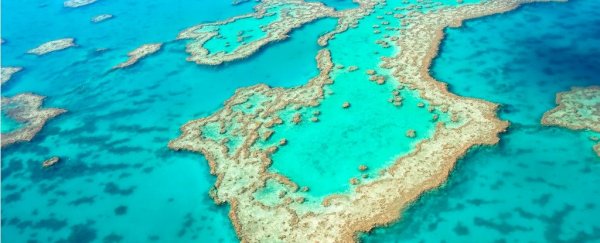Last month, Prime Minister Malcolm Turnbull announced that Australia would be allocating over $500 million Australian dollars (or $379 million USD) in a last-ditch attempt to save the Great Barrier Reef.
The amount is unprecedented, and is the single largest investment that the imperilled ecosystem has ever seen.
But as promising as this news appears on the surface, Australian politicians are raising some major red flags.
Out of that $500 million, about $444 million has been allocated to a tiny, private organization, with no more than six full-time employees, called the Great Barrier Reef Foundation.
It gets even more confusing, because that partnership appears to have come about without appropriate due diligence. In fact, according to recent Senate hearings, there was absolutely no tender or application process before the grant was awarded.
Even now, the partnership has not been officially "consummated," as one government official put it.
"So many questions remain unanswered into how this small foundation …has been granted hundreds of millions in public funding and why the government bypassed the specially designed public bodies that are already doing this work," said Greens senator Peter Whish-Wilson, the party's spokesperson for healthy oceans.
"[The Greens] also have enormous concerns about whether this organisation has anything close to the levels of expertise or governance to effectively distribute this funding.
"No amount of natural resource management or science funding has ever been subjected to so little scrutiny as to where the money ends up."
Even the Great Barrier Reef Foundation was shocked, not only because it is so small, but also because it did not apply for the funding. In fact, the Department of Environment and Energy approached the foundation about the partnership just weeks before the budget.
As small as they are, the foundation has zero experience dealing with such a large grant, which will be given to the non-profit up front as a lump sum if and when the partnership is solidified.
The foundation described the whole thing as like "winning the lotto."
"The foundation is well-placed, having raised tens of millions of dollars previously, to be able to administer investments in the reef and associated programs," argued education minister Simon Birmingham.
Still, anyone who is able to do even the simplest math could figure out that tens of millions is significantly less than hundreds of millions.
Plus, to this day, there is still no concrete answer on how the foundation will spend the millions of dollars, other than that the government will impose "clear conditions."
"The foundation is in the unique position of working across the entire science community and all levels of government, with leading scientists from different institutions, and the Great Barrier Reef Marine Park Authority – the reef managers," a spokeswoman said.
"We work with everyone in the reef community to find the gaps, to find the points of innovation, and to find the areas of greatest impact."
During Senate estimates hearings, Australian lawmakers wondered why the money hadn't gone to straight to the Reef Trust, which was set up by the Coalition, or other government agencies like the Australian Institute of Marine Science that are better equipped to deal with the issue, and that the government has far more control over.
They were met with evasive answer after evasive answer from officials at the department.
"[The Great Barrier Reef Foundation] should be invited to compete for that funding, and it should be done in a transparent way," said Labor senator Kristina Keneally.
"What we have learnt today is that the government decided to give this foundation the money before they'd approached the board to discuss it."
Now, the Greens and some Labour politicians are pushing for a Senate inquiry into the grant, which would determine whether the organization is up to the intimidating task it has been given.
Science AF is ScienceAlert's new editorial section where we explore society's most complex problems using science, sanity and humor.
